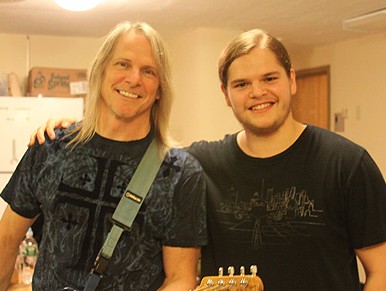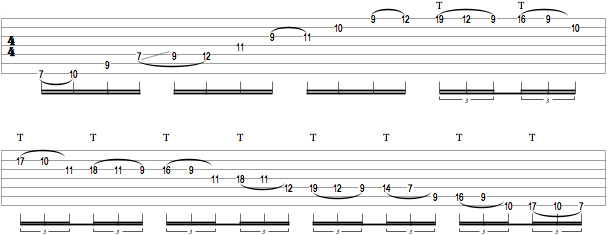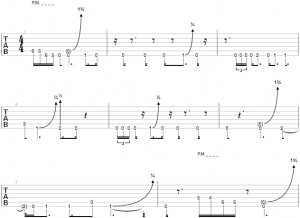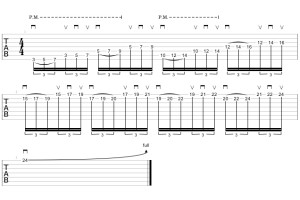 Arguably, Steve embarked upon his career in the 10th grade, after being expelled from school for refusing to cut his hair. It makes sense then, that in an industry of ever-changing trends, Steve Morse stands on his own – having forged himself a 30-plus year music career while staying true to his music, and making a point of approaching his duties with the utmost dignity and professionalism.
Arguably, Steve embarked upon his career in the 10th grade, after being expelled from school for refusing to cut his hair. It makes sense then, that in an industry of ever-changing trends, Steve Morse stands on his own – having forged himself a 30-plus year music career while staying true to his music, and making a point of approaching his duties with the utmost dignity and professionalism.
His musicianship transcends the boundaries of style – whether he’s playing fusion with the Dixie Dregs, progressive rock with Kansas, hard rock with Deep Purple, or a blend of all of the above mixed with country and classical with the Steve Morse Band.
Steve’s playing style is as instantly identifiable as it is versatile: it combines blues-inspired lines filled with chromaticism, exceptional alternate picking, rapid-fire arpeggios, classical fingerpicking and chordal ideas, and extensive tone manipulation, giving his guitar an array of voices that are each distinct, yet are all clearly Morse.
For five years in a row Steve was voted “Best Overall Guitarist,” by the readers of Guitar Player Magazine, placing him among two other legends in the “Guitar Player Hall of Fame.” I spoke with Steve at the Berklee Performance Center in Boston, MA during his tour in support of the latest release by the Steve Morse Band, Out Standing In Their Field.
IC: How’s the tour in support of Out Standing In Their Field going?
SM: It’s going good. We’re right in the middle of it – this is the end of the first week. In fact, this marks about the sixth day that we’ve spent playing together in the last few years [laughs]. It’s pretty intense. Actually, Dave [LaRue, bass] and I rehearsed at my place before we started the tour. We met Van [Romaine, drums] at the first gig and we just went [makes cracking noise] – instant, total immersion. These guys are pros, so it works with them – and we recorded the album together and everything, so it’s not like we’re strangers.
IC: What was the recording process for the new album? I know you have a studio at home – did you record there?
SM: Pretty much everybody does. Van did the drums at his place up in Manhattan – he has a studio with an actual engineer, and Dave and I just do our stuff in our own little studios. If I’m going to work for a half an hour at one in the morning… you just can’t get an engineer to come over in some small town. You pretty much have to figure it out yourself. The software has lots of possibilities if you’re manipulating sound – but if you’re just plain old recording what you do, it’s real easy to work with and it’s no problem to do that. That’s my approach – to play it and get it right, and take the right ones, and layer it and make it sound good. We don’t change much.
IC: What was the writing process like for this one compared to previous releases?
SM: It was very similar. A lot of times Dave and I will sit down together and work on stuff, just sitting in chairs – and I’ll have an idea that I’d like him to try and it gives me an idea of something to work on. Some of the tunes were already pretty much composed and brought in, like ‘Flight Of The Osprey’ and ‘Baroque ‘N Dreams,’ that just had to be written out and planned out, pretty much every note. In some areas there was like: ‘Let’s do a thing there.’ We had this long bass solo: ‘I’ll do a laid back thing like this [plays chill chords] and you do a bass solo.’ So obviously that has to be realized as an improv, but that’s just a section. We never do a whole tune of improv, because even though it would be fun to do for us, I think it would be less fun to listen to, for a lot of people [laughs].
IC: I know some of your solo records in the past have been on Magna Carta, and I believe you’re with a new label on this one.
| [flashvideo file=”https://guitarmessenger.com/wp-content/uploads/2009/10/Steve-Morse-Interview.flv” width=450 height=273 image=”https://guitarmessenger.com/wp-content/uploads/2009/10/steve_morse_video.jpg” /] |
SM: Yeah, we’ve done lots of one-off projects, too – like being on this or that tribute album or compilation, or doing a guest with a ton of guys [like] Dream Theater or something like that. But this is starting in a different direction with Eagle Records. They have all of the new Deep Purple catalogued, and because of that it’s better to consolidate all of the offshoots of Deep Purple, if possible. We have a different American label – Eagle Rock [a related label].
IC: Have you ever considered putting anything out on your own label?
SM: I’m not really the businessman. We have an album that I could do that with, but I can’t even keep up with emails. There’s so many. So I have to face reality – somebody else has gotta do it. If I retired – if I chopped off my fingers working on some farm equipment of something, then that would be the time to get more into the business end, but right now I’m totally absorbed with keeping up with all of the things that are going on, plus practicing, plus writing, plus touring and all of that. So no, I haven’t been able to be the consummate businessman and do it all myself.
IC: You’ve always had a lot of projects going on – the Dixie Dregs, Steve Morse Band and Deep Purple. What else do you have going on right now?
SM: I have an album coming out in January with a really good female singer – sort of like a Sarah McLachlan-type of pure, beautiful vocal, and we wrote an album together – it took us a couple of years to do. The album’s called Angelfire, and it’s sort of like acoustic Steve Morse composition – mostly acoustic. I’ve got Dave and Van on the record, too, but it’s less like the Steve Morse Band and more like… it’s sort of a different direction. It’s not entirely wimpy or anything like that, but it is acoustic. It’s not meant to be exactly any one genre.
I wrote stuff that I’d like to hear her sing, things that I’d like to listen to – soothing, beautiful music. Yeah, there’s no other word for it. But since she didn’t come from Star Search or MTV, or have a real super-aggressive look or whatever, it’s not going to be aimed at the music business. It’s aimed at people that are looking for music that is not on every street corner – that you can’t find at Wal-Mart. It’s called Angelfire, and it’s going to be on Radiant Records. They do releases for Kerry Livgren from Kansas and Neal Morse from Spock’s Beard, and they’ll be doing this one.
 IC: Cool. What’s the singer’s name?
IC: Cool. What’s the singer’s name?
SM: Sarah Spencer – thanks for reminding me. She was classically trained – absolutely gorgeous voice, she just blew me away with that. There’s no pitch correction on this recording [laughs].
IC: I know you mentioned in another interview that I was reading up on, that some of the old Dixie Dregs albums you can’t put out or sell, because the labels own the masters and you’re unable to do anything with them – they’re not willing to put them out.
In the Copyright Act of 1976, which was put into effect in 1978, there’s a 35-year reversion clause – which means that 35 years after 1978, in 2013, you might be able to get back your copyrights to that music.
SM: I hope so. We might have to look into that – especially if I end up cutting off my fingers in a piece of farming equipment [laughs]. I work with stuff all the time, and by not worrying about it, nothing bad seems to happen. The minute I start worrying about it: ‘I gotta be careful not to… OHHH!’ There are so many things in the business end of writing music with the Dregs that just went wrong. I mean, one thing after another. We were doing our fourth album, and I had yet to get any royalties from the first three – and it never happened. It just never happened. It’s just strange. That had a lot to do with Capricorn Records going bankrupt at the end of our third album. Bankruptcy changed a lot of things. Anyway, we can talk about something else [laughs].
IC: The new album sounds really organic – did you stick with your Marshalls, or was it the new Engl rig?
SM: It’s a combination of stuff. I had an Engl amp, but it wasn’t the Engl amp [Engl Steve Morse Special Signature 100] until near the end. [The Engl I had] sounded not quite as warm and low-midrangey as I’d like, so I didn’t use some of it. And I just do this thing while I’m recording – if I had a sound that worked with the last song, I’ll just start with something different for the next song [laughs]. I know, it’s like shooting yourself in the foot, but to me it’s fun to work with a different sound each time.
So I make a small adjustment, whether it’s using a different mic or a different speaker cabinet, or changing amp heads – I do change something on every song. The commonality of course is the guitars, the playing style, and the nature of what I choose sonically – that will make them all sound similar. Some of them I did with an Engl amp on one side, and a Line 6 Pod on the other, and used about 20% of the Pod, and 80% of the Engl – things like that. I like combining mics, but it almost always makes a hollow, somewhat unsuitable sound – it creates phase problems.
So I’ve been trying combining different amps using a splitter, and that’s kind of neat. I did a lot of that, too. I don’t write [my settings] down, so I remember in one of the tunes, I wanted to go back and change the arrangement, and I said: ‘I have no idea what I did for this sound!’ So there was no way to duplicate it exactly. That happens a lot. With the Dregs and with my stuff, I used to always print whatever sound it was with effects and everything, just print it – believe in it, commit, put it on tape and just walk away. Whereas with a lot of people: ‘It’s always got to be dry and clean! We don’t want to put all that in the mix.’ To me, the mix should just be: turn everything up and it sounds good.
IC: Has your live rig changed at all over the last couple of years?
[View pictures of Steve Morse’s live rig from the 2009 Out Standing In Their Field Tour]
SM: Yeah. The new Engl amp has changed everything, in that it’s the new amp. Other than that, it’s pretty similar. Same deal – long delay, short delay, control them with Ernie Ball Volume Pedals, bring some of them back into a second amp, and have the effects all wet, so that I only need a little bit of it, and the second amp is only speaking a little bit of delays.

Steve Morse and Dave LaRue
IC: Did you change the delays? I remember reading somewhere that your old delays that you had been using for years with your old Marshall rig weren’t working anymore, and you were looking to get some new units.
SM: Yeah, the new [Electro-Harmonix] Memory Man is what we’ve settled on. The old Memory Mans – we bought a bunch of them, and some of them just crapped out from being bounced around a lot. That’s part of it – you find something that works in your bedroom or your studio, and that’s fine, but it’s gotta be subjected to the most ridiculous amount of vibration and impact when it gets used on the road. So I’ve settled on the new Memory Man – I don’t have any affiliation with them, I’ve just been buying them when I need them. I’m trying almost every pedal that comes out, trying to find a good replacement for the old Lexicon stuff that I like. So It’s a work in progress, still.
IC: I’ve heard you play through so many different rigs in different situations – clinics, interviews, shows and whatnot – and the signature sound is always there. Do you have certain settings that you can rely on and tweak from there?
JW: This amp you brought – there’s a choice of one to ten with the tone. I have it on one, or zero [laughs]. My purple guitars, the [Ernie Ball Music Man Steve Morse] Y2D guitars, are much hotter pickup-wise than this one [the original Music Man Steve Morse model]. This one is more versatile, with a little bit more high-end so I can do jazz or country things. I have the pickups backed off away from the strings, because there are so many magnets. So because of that, I need some gain.
So the gain is way up, and the tone is way down – that way I can go [plays gritty descending lick with pinch harmonics]. Something I’d always do is play the lead pickup down low, and then switch to the neck pickup when I go up high. Then a lot of times, with whatever amp I’m using, if I want to get a clean sound without changing the channel, I’ll switch to one of the single coil pickups that are backed away from the string. That adds some high end and some thinness that you lose when you turn down your guitar. So I turn down the guitar to two or three, and then go to those [plays on humbuckers with guitar volume on high, then turns down the volume and switches to a single coil pickup].
IC: Do you tend to switch a lot between this guitar and the Y2D?
SM: With Deep Purple, I use different Y2D guitars – I have one with a whammy, and one with the low E string tuned down to D. It’s the ultimate luxury – I just go like this [holds out hand] and a new guitar appears, and I just go put it on and: ‘Oh, wow! It’s got nice new clean strings! That’s nice.’ This gig is totally different: ‘Oh, we’ve only got 465 miles to go! We can maybe make the gig. Oh, yeah – I have to change my strings. Yeah, I’ll get right to it.’
So I just leave this guitar on the whole time, except for when we’re doing the classical thing, and I have my Y2D up there with the same MIDI setup – so if I break a string on this, I’ll just plug in the Y2D and probably play it for the rest of the night, even though the [pickup] switching is different. It’s a little bit confusing for me, but I’m used to the two guitars – I just have to think for a minute. I have a five-way switch that has all of these combinations that I use – a four-pull five-way switch on the Y2D. That makes it easier for people to say: ‘Okay, that’s how you change sounds.’ Whereas this [guitar] is intimidating to a lot of people, because there’s a three-way, a three-way and a two-way [switch].
IC: A lot of guys are influenced by your combination of alternate picking and chromaticism in pentatonic lines – [how did you get into incorporating that ‘outside’ style of playing?]
 SM: Through a combination of listening to players like Albert Lee and James Burton, and horn players and traditional jazz players – a lot of it was Texas swing, hearing people live and going: ‘Wow, that’s so cool! He’s playing a lot of different notes, but the notes that work ring through.’ And that’s pretty much the basics of it – just play the notes that fit in the best on the strong part of the beat, and if you’re going to put the grace notes in, have them on the weak part of the beat.
SM: Through a combination of listening to players like Albert Lee and James Burton, and horn players and traditional jazz players – a lot of it was Texas swing, hearing people live and going: ‘Wow, that’s so cool! He’s playing a lot of different notes, but the notes that work ring through.’ And that’s pretty much the basics of it – just play the notes that fit in the best on the strong part of the beat, and if you’re going to put the grace notes in, have them on the weak part of the beat.
Like if you’re doing a sextuplet line, the third and sixth notes would be a great place to put a note that doesn’t quite fit in the scale, or is a connecting note. [plays example] That’s how I would play that, instead of straight, like that. Then instead of just sitting on the note, do another bend. Using the bends makes the guitar more expressive.
Everybody’s heard guitar samples on synths, and unless the synth player’s got this incredible way of thinking where they can do the bends and everything, it’s not going to sound right. That’s part of the expression of the guitar. That’s why animatronics and computer-generated movies, as realistic as they can be, still don’t quite convince us totally – because of those little micro-expressions that we recognize in reality. The guitar – everything you play is full of that kind of thing.
IC: So it’s kind of the jazz approach of placing the off-notes on offbeats, but you’re adding your own touch to that, with your own kind of phrasing and the bends and all that.
SM: And I’m coming from a pop/rock [background] in terms of phrasing – classical, pop/rock, country, whatever. It’s all very general – nothing really outside. It’s very tonal phrasing, diatonic phrasing – I just add some chromatic notes to make it more interesting. The basic idea is to just play inside. I’m not an outside player, really.
IC: Do you still have a regular practice routine that you go through?
SM: Oh, yeah. My technique requires a lot of upkeep.
IC: I can imagine [laughs].
IC: Outside of the time that you spend dealing with music, what are some of your hobbies?
SM: Oh, I’ve got a lot of hobbies. I love flying – I fly almost everyday that I can. I have an airstrip at my home – I live on a farm. It’s not uncommon for people where I live to have something like that. The farm itself – I don’t know if you’d call it a hobby, but it’s a big responsibility. There’s a lot of things to do. I have a bunch of old tractors. I have a bunch that will just start when you turn the key, but then a bunch of them that I have to work on.
I have a lot of old implements – hay balers and cutters… There’s always work to do, and stuff keeps growing, so I’m always cutting and spraying and baling and fixing – a lot of fixing. Chasing the birds, fixing, doing some welding – things like that, and, of course, just life itself. When you have kids, you’re going to be spending a lot of time seeing what your kids are doing, and taking them places and so on. So those are my hobbies.

IC: Can you tell us one thing that you’ve never mentioned before in an interview – a story, an experience or something about yourself that you haven’t shared before?
SM: How about what’s happening tonight? We’re playing, the Steve Morse Band – which originally was with Rod Morgenstein [on drums] and Jerry Peek [on bass], and then become Van Romaine and Dave LaRue, playing drums and bass. Rod Morgenstein and I go back to the early 70’s, when we met at the University of Miami, playing in basically the Dixie Dregs – it was called the University of Miami Rock Ensemble #2, and we met on Tuesdays and Thursdays at seven p.m. or whatever. That became our band.
Tonight, Rod’s going to be sitting in, playing drums with Van – playing this incredible solo that they worked out together. I think it’s really neat when people can be open like that. Instead of Van having the attitude of: ‘Oh, I’ve gotta protect my turf. No one else is gonna sit in.’ Rod and I are like brothers, so it’s great for him to come along and do this.
Something I never get to mention in interviews, is to encourage people to support other musicians – give them a leg up. Rod doesn’t need a leg up – Rod is a professor here at Berklee. But I’m saying that when you see a chance to help somebody that you think is good, do it. Don’t say somebody’s great that isn’t, of course – but if you know somebody’s playing good and playing from the heart and there’s anyway you can help them, do.
Keep that fraternity alive of people that really love music, because there’s a lot of people getting into the music business because they see Star Search or America’s Got Talent, those kind of shows, where it’s instant fame and money. Just support people that really play from the heart, and remember that. If you see somebody you know and you’ve got the chance, and wherever you’re playing is cool with it, have them come up and sit in – pass it on.
IC: What advice do you have for aspiring musicians looking to break into the industry and share their music?
SM: A lot. This could go on forever. The first thing is responsibility – you have to be a responsible person and an independent person to be a musician that’s going to make it. The chances are very good that the things that will make you famous in your own way, the classic things that happen musically in your life, will come from unexpected places.
Like this guy says: ‘Hey, man, You wanna come over and jam? I’ve got a little recording deal on my laptop.’ ‘Alright, let’s do that.’ Those are the sessions that could end up being the best things you ever write. Chances are it will not be a phone call from somebody saying: ‘Our band is huge and famous, we have millions of dollars. We just want to give it to somebody, if we could only find a guitar player.’ No, that’s not going to happen. But what will happen is your peers saying: ‘I wish I had somebody to work on this with.’ or ‘This gig is free and it’s 50 miles away – could you do it?’
So in order to take advantage of those opportunities, you have to keep your overhead low and make yourself available. So I suggest not starting a family until you’re well into your career. In other words, don’t take on any responsibilities other than your music. That means no debt – learn how to change the oil in the car, and learn how to get a lot out of a little bit of equipment. Buy small, quality stuff that you can carry yourself. The bigger your enterprise is, the more difficult it will be to take advantage of opportunities. So keep your overhead low, limit your other responsibilities, and strive for excellence in everything.

Steve Morse and Ivan Chopik in 2009
If you have a day job and you’re flipping burgers four hours a day, flip those burgers right onto the middle of the bun. Make everything count. If you’re sweeping the floor, don’t say it’s okay that you left that piece of dirt behind. Say: ‘If I sweep up every bit of this dirt to the best of my ability, that’s going to affect the way I play music. It’s going to make everything I do strive for perfection.’
That’s how you can tell if somebody’s going to make it or not – it’s not by whether or not they know somebody’s phone number on Star Search. Those are the kind of people that, when the opportunities come – and every couple of years or so, everyone will get these, what other people would say are once-in-a-lifetime opportunities, but they will keep coming… the people that are ready, and luck allows them to, and fate allows them to, will find that they will get connected.
There are no players that are incredible that go unnoticed forever – unless they’re on a deserted island with no communication whatsoever. Make yourself available to the public, and [if you] keep your options open and are playing great, somebody’s going to notice you sooner or later. It’s inevitable. If you want to do the whole road thing – being in a band, forming a band, keep all of your options open and limit your responsibilities. Low overhead – and by low, I mean low. Don’t buy a new car – just down to the bone. Pay off your guitar, pay off your amp, get a few effects – it’s common sense. The less you need to make, the more opportunities you can take, and the more jams you can go to. I promise you, that’s where it will all come from. It won’t be from some phone call saying: ‘Here’s a million dollars. I just need somebody to take it. I can’t find anybody that plays guitar.’
















